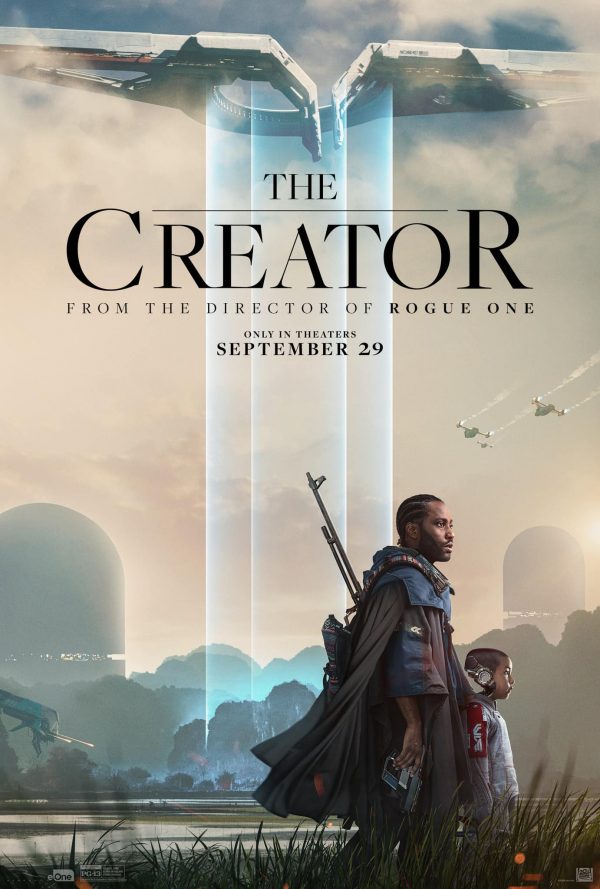
“The Creator” (2023). John David Washington, Madeleine Yuna Voyles, Gemma Chan, Allison Janney, Ken Watanabe, Sturgill Simpson, Robbie Tann, Marc Menchaca, Amar Chadha-Patel, Ralph Ineson, Veronica Ngo. Director: Gareth Edwards. Screenplay: Gareth Edwards and Chris Weitz. Story: Gareth Edwards. Web site. Trailer.
Needless to say, given what happened in Los Angeles, Americans feel threatened by New Asia’s continued use of AI. And years of a concerted effort to rebuild the devastated metropolis have only hardened the nation’s resolve to force their Far Eastern counterparts to give up on this technology. So, to bring about this change, the US military has spent years developing initiatives to bring New Asia to its knees on this question. Some of them have been overt, such as building NOMAD, a sophisticated aerial global security system that makes Ronald Reagan’s Strategic Defense Initiative look like a glorified cap gun. Others have been covert, such as the deployment of secret operatives in New Asia to gather intelligence about its AI research and development, identifying its chief scientists and their projects, as well as finding the locations of its R&D laboratories.
Heading up the US military’s most secret operation is Sgt. Joshua Taylor (John David Washington), who has been clandestinely scoping out New Asia’s principal research lab, all in hopes of finding Nirmata, the alleged chief architect of the enemy’s AI technology. When not carrying out his covert activities, Joshua lives what appears to be a fairly ordinary life with his pregnant wife, Maya (Gemma Chan). However, unbeknownst to Taylor, the US military suspects that his wife may be Nirmata’s daughter, and so, late one evening, an army strike force attacks their home in search of her. But, when Maya learns through this assault that her husband is an undercover operative, she runs off, only to be killed apparently during a NOMAD strike that’s part of the operation.
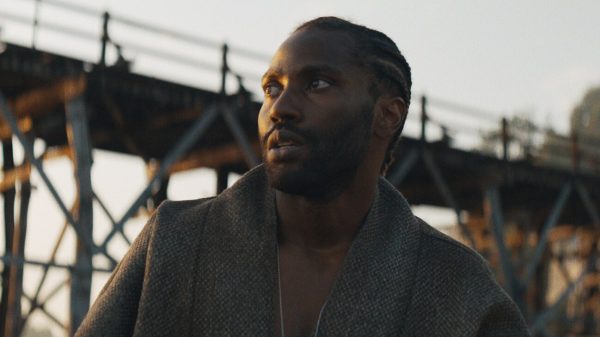
Taylor manages to survive the attack but is severely maimed. He returns to Los Angeles to recuperate and spends the next five years working on one of the city’s recovery crews, vowing to never again participate in any military operations. However, quite unexpectedly, he’s approached by two army officers, Gen. Andrews (Ralph Ineson) and Col. Howell (Allison Janney), who seek to recruit him for a new assignment overseas. Intelligence reports have revealed that Nirmata has supposedly created a super-weapon of some kind that could devastate the West, one developed at the lab Taylor had been investigating at the time of the military strike on his Asian home. Andrews and Howell want to tap Taylor for the assignment because he’s the only one familiar with the layout of the lab and would make the best candidate for leading an assault on the facility. He reluctantly agrees and before long is making his way back to the place he had hoped to never see again.
The assault on the lab doesn’t go quite as planned, but Taylor successfully manages to make his way into the facility. He quickly determines the location of the secret weapon, but what he finds is entirely unexpected – it’s a robotic child (Madeleine Yuna Voyles). She sits in a chair surrounded by toys and watching cartoons. Taylor can hardly believe what he sees. But he also soon discovers that this is no ordinary “child.”
With enemy forces advancing on his location, Taylor flees with the “weapon.” But what comes next? He decides to visit his old friend Drew (Sturgill Simpson), his former commanding officer and an AI expert who lives in the provincial capital. Taylor and the young simulant – whom he calls “Alphie” – thus take off on a perilous cross-country journey with enemy troops and his own surviving colleagues in pursuit, but he manages to make it to the capital unscathed. However, once there, after Drew examines the child, Taylor learns that Alphie has special powers and the ability to expand her capabilities, traits that make her potentially the most powerful weapon in the world – and the most highly sought-after commodity on the planet.
Taylor’s pursuers catch up with him not long thereafter, forcing him and Alphie on the run again. It launches the duo into an odyssey that brings them in touch with an old ally, Harun (Ken Watanabe), a simulant soldier who becomes Alphie’s de facto protector, and a series of surprising revelations about Maya and her past. These developments and others further up the ante for the reluctant fugitives. They must keep moving to avoid capture and to bring to light truths that have long been hidden about Alphie and the reasons for her creation, as well as some dirty little secrets about America’s real interest in suppressing AI technology. Can they survive this ordeal and make these revelations known to the world? It will ask much of Taylor and Alphie and subject them to a rollercoaster ride of events that constantly place them in peril.
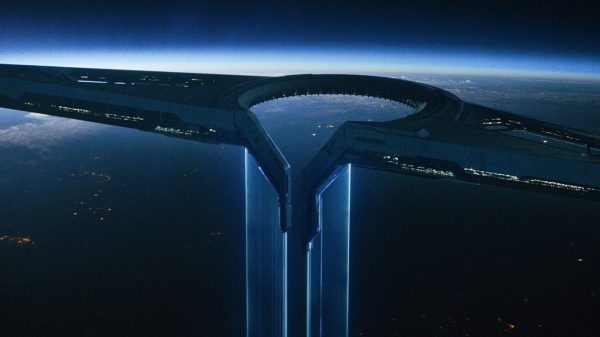
There’s a long-held sentiment common in business and scientific circles (among others) that, if we possess the capability and desire to create something, why not do it? But is this truly a wise course to follow? Admittedly, following this path has led to the development of countless products, services and technologies that have made our world a better and more comfortable place. Consider the contributions of Thomas Edison, Nikola Tesla, Steve Jobs, the Wright Brothers and many others, just to name a few. But can we say the same of those who wrought nuclear capabilities, dangerous biological and pharmaceutical substances, and advanced weaponry systems? Indeed, just because we can do something, does that necessarily mean we should pursue it? As I wrote in my most recent book, Third Real: Conscious Creation Goes Back to the Movies, numerous movies have illustrated the potential issues associated with such manifestations, such as “Jurassic Park” (1993), “Ex Machina” (2014), “Young Frankenstein” (1974) and “Gremlins” (1984). Are these pictures overblown exercises in paranoia, or are they cautionary tales we’d be wise to heed? And, in light of the recent and rapid proliferation of artificial intelligence, do they carry messages that we should apply to the emergence of this new technology?
Much depends on what we believe about the risks and merits of AI, and that’s crucial to consider given the role that our beliefs play in the manifestation of such materializations in our existence. Such is the core principle underlying the conscious creation process, the philosophy that maintains we draw upon the power of our thoughts, beliefs and intents in bringing about the reality around us. It’s unclear how many of us are aware of this school of thought, but, when we consider all that we’ve achieved as a species, its impact should be fairly apparent – and give us pause to think about how we apply it when charting new turf.
That’s particularly true where our intents are concerned, and it’s a key aspect of the message in “The Creator.” As the film observes, the proponents of artificial intelligence in this story apparently went about applying this technology to virtually everything and seemingly without thinking through the potential consequences, a practice often referred to as un-conscious creation or creation by default, where the ends outweigh whatever possible side effects might result from blindly following through on the manifestation of our beliefs. It’s akin to putting on a blindfold and getting behind the wheel of a car before going out for a drive. Who would realistically do that? Yet it’s astounding how often so many of us engage in comparable pursuits. Is that wise for someone playing a creator role in any kind of venture?
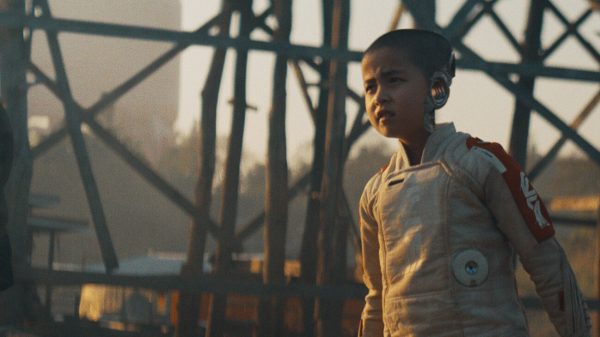
Those side effects are especially worrisome, because, no matter how thoroughly we may think we’ve thought things through, there’s always the possibility that we may have overlooked something, such as beliefs that are inherently part of our creations that we don’t recognize. It’s as if such notions come along for the ride without us being aware of them, yet they’re part of the belief mix that goes into the realization of these manifestations. And, because of this, there’s the possibility that they don’t belong there, that they can unwittingly contaminate or undermine the larger materializations that are being sought.
This should be particularly concerning when it comes to its inclusion in something like artificial intelligence, something we assume is based on logic and reason. But what if the rationale behind this technology is tainted by beliefs and intents that don’t strictly follow the rules of such concepts? What if we inadvertently incorporate notions associated with illogical considerations, such as unchecked emotions or elements of human failings? That’s ultimately not much different from the act of poisoning the well, and, if it’s allowed to be brought into being, it may be difficult to unscramble the egg, perhaps even resulting in incidents like the seminal event that sets off the storyline in this film. Talk about human error.
One of the points that this picture seriously encourages us to examine can be found right in its title. By developing AI, it’s highly plausible that we take on the role of “creator” in a context not unlike what we find in the religions of the world. The tremendous power of our beliefs and intents in a context like this can indeed be invoked to create something of incredible potency, persistence and influence. And that materialization will invariably be imbued with whatever characteristics we put into it, for better or worse and whether or not we’re aware of all of them. Unfortunately, if something that’s not in our best interests makes its way in, we may not find out about it until it’s too late.
A chilling example of this can be seen in the movie “2010: The Year We Make Contact” (1984), sequel to the cinematic classic “2001: A Space Odyssey” (1968). In this follow-up offering, computer scientist Dr. Chandra (Bob Balaban) investigates why one of his AI creations, the highly sophisticated HAL 9000 computer, malfunctioned with serious consequences while on a space mission to Jupiter nine years earlier. Through this inquiry, Chandra learns that the computer had been reprogrammed by parties with their own agenda – without his knowledge – to carry out orders that contradicted HAL’s basic software. This change left the computer with a quandary that it was unable to resolve, given that these instructions violated its programming. This revelation thus prompted Chandra to sadly observe that his creation had been instructed to lie by people who find it easy to lie. That’s truly tragic. And, if something like that could happen in fictional pieces like “2001” and “2010,” who’s to say that it couldn’t happen in a real-life setting as well? “The Creator” seeks to make that very point through its own narrative, and it’s advice we should take to heart.
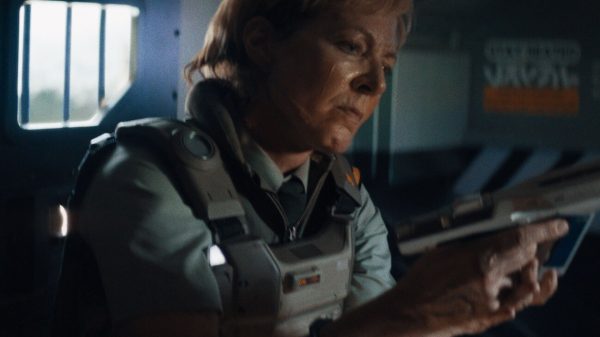
When undertaking such endeavors, it’s essential that we recognize the inherent responsibility associated with them, a concept that we as humans often have difficulty embracing. As illustrated here, when artificial intelligence supposedly lets us down, we tend to blame the technology for its failings. But is this fair? After all, who created the technology in the first place? That’s quite a sobering thought – and one that “The Creator” fervently urges us to ponder before it’s too late. That’s especially true now as AI continues to gain a greater foothold in our existence. Let’s hope we have the wisdom to develop it so that it doesn’t do the unthinkable to us. Of course, for that to happen, we have to put in the necessary thought up front to prevent such troubling possibilities from emerging in the first place.
The question of responsibility applies on multiple levels in this film. In addition to the sanctity of the technology’s development, the picture also addresses responsibility from the standpoint of how we apply it, namely, in our intentions related to the sovereignty and sentience of the AI beings we have created. If simulants have genuinely attained their own degree of consciousness, is it fair to prevent them from using it to their fullest capacity, or are they merely to be treated as slaves to serve human needs? Is it responsible of us to create them as sentient beings only to keep them chained for the fulfillment of our own capricious wishes and desires?
Likewise, matters of responsibility are also raised in the nature of diplomatic and economic relations between America and New Asia. Is the conflict between them really based on the existence of AI technology, or is this a proxy excuse for something more clandestine and insidious, such as which of these powers is destined to come out on top as the alpha dog of the world? What’s more, can the supposedly ethical Americans be relied upon to keep their word to the planet about their alleged abandonment of artificial intelligence? For instance, their NOMAD global security system sure doesn’t look like it’s run on punch cards and floppy disks. Indeed, how sincere is their intent to this commitment? And, to boot, isn’t it possible that such insincere intents can make their way into the programming of this and other comparable technologies? Where is the responsibility in that?
It’s important to recognize and honestly address all of the foregoing considerations. If we don’t, the applications we create from employing tainted intents could seriously come back to bite us in our collective posteriors. Is that progress? Is that what this technology is all about? If we can’t answer those questions truthfully, maybe we’d better go back and review and revise our thinking.
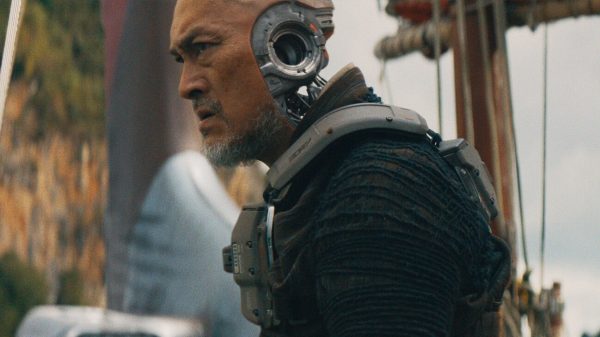
The development of artificial intelligence has given us much to think about. Writer-director Gareth Edwards’s latest feature offering covers a great deal of ground related to the subject technologically, ethically and geopolitically, providing viewers with a poignant metaphor for all of these areas, the examination of which grows progressively stronger and more impressive as the story plays out. However, in the film’s prologue and opening act, the narrative comes across like a somewhat uninspired amalgamation of sci-fi tropes culled from an array of other movies and TV series, including “Blade Runner” (1982), “Edge of Tomorrow” (2014), “Oblivion” (2013), “I, Robot” (2004), “Midnight Special” (2016), “The Terminator” franchise and the rebooted version of Battlestar Gallactica (2004-2009), among others. Also, the story, much of which consists of an involved high-stakes pursuit, is overly stretched out at times, a plot element that could have been improved upon with some judicious editing. To its credit, though, the picture features excellent special effects, a fair amount of smartly written comic relief and a surprisingly good cast for a sci-fi release (particularly Washington and youthful newcomer Voyles, despite the serious miscasting of Janney for a role for which she’s ill-suited). “The Creator” is indeed more insightful and thought-provoking than what many of its detractors have said, though it’s understandable how its periodic lapses in originality and inventiveness may be seen as undermining these strengths. Nevertheless, these shortcomings should be taken with a grain of salt, and the film should be given a fair shot for what it has to say about something that’s becoming an increasingly more significant aspect of our lives, something that we had better to learn to understand and live with if we hope to make friends with it as part of our existence going forward. The film is playing theatrically.
Famed author and visionary Arthur C. Clarke once observed, “As our own species is in the process of proving, one cannot have superior science and inferior morals. The combination is unstable and self-destroying.” He illustrated that point in his own works, “2001” and “2010,” and director Edwards echoes those notions here. If those sentiments keep coming up in the zeitgeist as often as they do, then maybe they’re something worth listening to while we still have the time and wherewithal to do so.
Copyright © 2023, by Brent Marchant. All rights reserved.

No comments:
Post a Comment